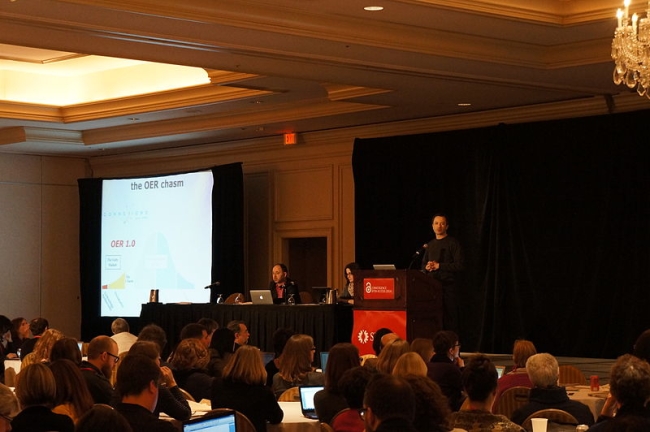You have /5 articles left.
Sign up for a free account or log in.

Wikimedia Commons
Conferences are not cheap. They are exhausting and usually require you to travel. You are taking time away from work, which means risking feeling behind when you return. You arrive home sleep-deprived, information-overloaded, and struggling to play catch-up. So why do we go? We attend conferences to learn, network, and take new ideas back to our institutions. Does this always happen?
I've attended my fair share of conferences where I thought I was going to absorb information and return a changed professional simply by breathing the conference hotel air and getting less-than-adequate sleep. I have yet to be so lucky. I have learned through many mistakes of just going through the motions that getting the most out of your conference experience takes intentionality and a lot of planning.
Recently I was out of the office for a conference. It was three full days and I had to take a 2.5-hour train ride to get there and home. The conference was in Chicago. Pretty painless travel. I chatted with my colleague, relaxed, and drank coffee. This started things out on the right foot. I was feeling good. This was not my first time attending a conference, but it was my first time attending one with intentionality.
As I navigated my way through the conference, I compiled a list of things that helped me to put more intention into my conferencing. I hope that the list of tips below can help you navigate the next conference that you attend as well. I hope that this makes the possibility of bringing new ideas back to your office stronger and more likely!
Things to pack:
Snacks: Conference meals can be unpredictable, and you never know what will be served. Having healthy snacks that you typically eat at home stashed in your bag can help prevent major hunger emergencies! I have found that granola bars and apples travel really well and are easy to toss in your bag. Be wary of traveling with bananas -- nothing worse than a squished one in the bottom of your bag!
Water bottle: Dehydration is a reality at conferences if you do not plan ahead and bring a reusable water bottle with you. (Or you will rack up dollars quickly buying bottled water for $2 each). Between the caffeine and rushing from session to session, you can easily find yourself tired and dehydrated before the end of the day. Become a water fountain scout (you can usually find one near the restroom) and fill up your reusable water bottle whenever you can. I always bring a Nalgene because I can easily hook it on my bag when it is empty and it is there for me to refill it when I spot a water fountain.
Workout clothes/shoes: Think about if you are going to have time or make time to work out while you are away. If not, packing some more casual clothes is still a good idea for evenings if you have time to go for a walk or stretch before bed. I always travel with workout clothes and running shoes even if I think there will not be time. It is better to have them so that I can squeeze in a quick workout whenever I can.
Before the conference:
Review the conference schedule: Usually the conference schedule is available online a few weeks prior to the conference. If not, you can usually look at a previous year’s schedule to get an idea of what to expect. Taking a look at this ahead of time is a great idea and can help guide your packing. Look at which meals are provided, how early or late you are done each evening, and if there are any breaks throughout the day. Will you be going right from conference clothes to pajamas, or will there be a need for something more casual?
Plan your outfits: ...right down to the shoes and accessories. (If you're like me, this step is essential.) This will help with space as well as take some of the decision-making away during the conference. I love waking up and knowing exactly what I am going to wear. It makes the mornings much easier and I can sleep longer when I already know what my outfit will be!
Skim through session descriptions and think about which you might want to attend: It is nice to have an idea of which sessions you are thinking of attending. You do not have to make any decisions before you get there, but it could help to eliminate that temptation to just attend the same sessions as a friend or colleague. Get excited! Look at all those awesome sessions!
Transportation: What is your transportation plan? Will you be staying at the conference location? Will you have to walk? Take a bus? Drive in each day? I recommend trying to plan early so that you can stay at the hotel where the conference is being held. (We were not at the conference hotel this last time, but it made for some fun Chicago bus-ride adventures.) Thinking about these things ahead of time can help you also figure out what kinds of shoes to pack.
Goals: What are you hoping to get out of this conference? Spend some time thinking about some goals for yourself based on what you think the conference might be like. What are you excited about? What do you hope to learn while you are there?
During the conference:
Take notes: Mental notes, on a computer, iPad, notebook... How does note-taking best work for you? I love taking notes with a notepad and a pen. It helps me to retain the information and stay engaged if I write by hand.
Wear your name tag: It can help you connect with people and allows people to connect with you. It’s not cheesy, it’s cool!
Tweet: If you are on Twitter, this can be a great way to follow the conference, "meet" other attendees, share what you are learning, and engage in the dialogue in a different way! I love using Twitter while I am at conferences as well as following along with conferences on Twitter when I can't attend them myself.
Listen to your body: If you are tired, take a break. You will take in so much more information if you are alert, healthy, and rested. If that means going to bed early and skipping after-dinner drinks, listen to yourself and do what is best for you. The last conference I attended had built-in work sessions. I found this to be awesome and beneficial. This was, however, the first conference I have ever attended that had that as an option. In between sessions there would be about 20 minutes to talk with colleagues and start to implement and process what you just learned. If work sessions are not built into the conference schedule, how can you work them in yourself?
Resist the temptation to check your email: Put your “away from office” auto-response on and hold out on checking your email until evening, when the conference festivities are over, or, better yet, until you are back at the office post-conference. This is time for you to be engaged in the conference material, other attendees, and the whole experience. Your office knows you are away. The emails can wait.
Network: My partner and I talk about having “five seconds of professional courage” when networking at conferences. Conferences are a great time to meet people, and unless you put yourself out there and introduce yourself, you could miss out on some great conversations. I love the movie “We Bought A Zoo” which is where having five seconds of professional courage came from. “You know, sometimes all you need is 20 seconds of insane courage. Just literally 20 seconds of just embarrassing bravery. And I promise you, something great will come of it.” Try it. Five seconds of professional courage.
After the conference:
Look back through your notes: I like doing this when I am traveling home. It helps me to really think about what I hope to take back to my institution and what really stuck with me. Don’t let your notes end up in the bottom of a desk drawer somewhere. They are worth a lot! You wrote down some awesome stuff! Pull out some key points if you are overwhelmed by all of the awesome ideas you are going home with.
Rest: Allow yourself a good night’s sleep and some relaxation time before heading back to work, if possible. Coming down with a post-conference cold is no fun, and definitely will not help you implement some of your new ideas and things you learned.
Game plan: Have a game plan for how you are going to present some new ideas to your office. Too often, I get back from a conference and instead of talking about everything learned and what I am taking away from attending, I am overwhelmed by the workload that is waiting for me. Do not let that first week back go by without sharing with someone in your office (whether that be a supervisor or a colleague) something that you hope to implement. Even if it is small, this can help create an office culture where you inspire change and use what you learned. Maybe you can even give a mini presentation in a staff meeting? Think outside the box. Share!
I hope you leave your next conference feeling energized and excited to head back to your office with all of these new ideas. Good luck and happy conferencing!








